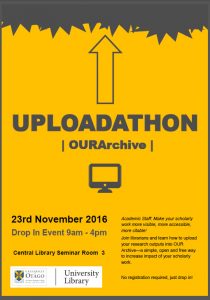By: Alexander Ritchie
On Wednesday 23 November the University of Otago Library will be hosting the first OUR Archive Uploadathon. This drop-in event will be held in Central Library Seminar Room 3 between 9am – 4pm as the final part of the Library’s Maximise your Research Impact series.
The aim is for academic staff from all disciplines to deposit their Otago research into OUR Archive, and librarians will be on hand to guide staff through the process of uploading key details and the research outputs (where publishing agreements allow). Anyone interested in coming along on the day is strongly encouraged to create an OUR Archive account in advance.
What exactly is an ‘Uploadathon’?
Uploadathon is one of those Frankenwords, a combining of upload(ing) and marathon, and is one of many civic-minded –thons, like New Zealand’s fundraising Telethons of the late 70s through to the early 90s. Uploadathons are more about raising research profile than money though, and bring academics together with librarians to deposit their research into institutional repositories in order to make the work both more visible, and easier for funders, research participant communities, and members of the public to access.
What is an Institutional Repository?
For those that don’t know, an institutional repository (IR) is an online collection of research produced by scholars at a particular institution. At the University of Otago, this is OUR Archive, and it includes not only theses and journal articles, but also grey literature and conference papers and posters. Together with the related disciplinary repositories, such as arXiv in Physics and Mathematics, institutional repositories are synonymous with Green Open Access publishing, where scholars self-archive their work, having obtained any necessary permissions from the publisher and any co-authors.
Why Would I Choose to Use One?
Dr Janet Stephenson makes a succinct and compelling case for the benefits of OUR Archive for the Centre for Sustainability in this short video interview – https://unitube.otago.ac.nz/view?m=oxRH9u8Os3U – but if you need more convincing, here are five reasons why uploading research to OUR Archive makes good sense:
- Visibility
Research is easier to find as search engines such as Google Scholar, and Aotearoa-based aggregators such as Digital NZ and NZResearch, harvest the metadata directly from the repository. Depositing work into OUR Archive and linking to that work from profiles on ResearchGate or Academia.edu can move research outputs higher in search engine results lists.
- (Open) Access
Institutional repositories are a way to enable public access to research. Self-archiving post- or pre-print versions of accepted research outputs is well established within certain sciences, and it not only broadens the availability of scholarly work, but helps ensure accountability to research participants, interested communities, and funders. Most scholarly publishers allow archiving of a post- or pre-print of a published article, but do check the SHERPA/RoMEO site if you are unsure about your situation.
- Stability
OUR Archive uses the Handle system to provide a stable URL, the digital equivalent of a permanent address for your research in the shifting sands of the digital realm. This is particularly important for grey literature, and outputs like conference posters, where ongoing access can be difficult to maintain.
- Citing and Counting
Research within both the Natural and Social Sciences, such as this 2010 article from Gargouri et al. and this 2015 piece from Atchison and Bull suggest that there is a measureable citation advantage through making your work openly available. OUR Archive also provides individual page view and download counts for all deposited outputs.
- Open Sourced and Locally Supported
OUR Archive uses the open source repository software DSpace, and the Library has local support staff who manage the repository and troubleshoot any issues that arise. This means timely responses to queries, and help when something goes wrong.
The Library continues to develop the OUR Archive platform and interface and wants to hear how we can improve it, so please drop us a line @ https://ourarchive.otago.ac.nz/feedback.
OUR Archive Uploadathon | Wednesday 23rd November 2016 | Drop In Event 9am‐4pm | Central Library Seminar Room 3
We look forward to seeing you there!
Acknowledgements: Thanks to Shiobhan Smith for her very useful report on OUR Archive which was invaluable in structuring this post.


